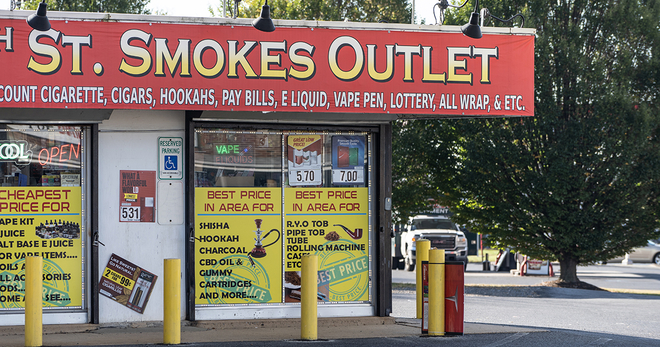What do pharmacists think about their stores selling tobacco?
Nearly a decade ago, the 62,000-member American Pharmacists Association issued a policy calling on pharmacies and facilities with pharmacies to stop selling tobacco products. Thousands of pharmacies currently ignore the recommendation and continue to sell tobacco — including Walgreens, the country’s second largest pharmacy chain — despite tobacco use being the No. 1 cause of preventable death and disease in the U.S.
Truth Initiative® has long supported tobacco-free pharmacies and has led a series of activism efforts aimed at getting pharmacies to stop selling tobacco. More than 12,000 young people (and counting) have signed truth®petitions supporting tobacco-free pharmacies, and many have shown up toone of five protests hosted in recent years across the country, including a zombie-themed protest at the Washington, D.C., flagship Walgreens store. For the past three years, Truth Initiative has also brought young people to the annual Walgreens shareholders meeting to directly ask about eliminating tobacco products from its stores. This year, Truth Initiative is also bringing pharmacists to the Jan. 25 Walgreens shareholders meeting to lend their voices.
To learn more about how pharmacists view the issue, Truth Initiative led a discussion with a group of 29 pharmacists in December 2018. Most participants worked in pharmacies without a ban on tobacco sales and around half of participants worked for Walgreens. Here are some common themes that emerged:
Most pharmacists, including Walgreens pharmacists, felt a ban would have a positive effect on customer health. Most pharmacists who already worked in a pharmacy with a ban agreed it has had a positive effect on customer health.
“We need to let everyone know we are here to improve your health, not damage it,” said one pharmacist who works in a tobacco-free pharmacy. Another put it this way: “Pharmacies are places that offer life-saving medications to patients. We should not be selling them harmful tobacco products.”
The pharmacists interviewed join a majority of the public in their support for tobacco-free pharmacies. Centers for Disease Control and Prevention data from 2016 showed that 66 percent of U.S. adults favored a ban on tobacco products in pharmacy stores, including nearly half of smokers. A separate Truth Initiative survey conducted in fall 2017 showed that nearly three-quarters — 73 percent — of Walgreens shoppers surveyed said the pharmacy chain should ban the sale of tobacco products. Additionally, more than a quarter of Walgreens shoppers — 27 percent — reported that they would shop at Walgreens more often if it stopped selling tobacco products.
Pharmacists see themselves as front-line healthcare providers and are concerned about tobacco use among customers, who they view as patients.
Pharmacists in the discussion group stressed their roles as healthcare providers. “We are the only healthcare professionals who see these individuals on a regular basis and can continuously push them to quit, and also have the up-to-date knowledge on latest therapies,” said a pharmacist working in a pharmacy that sells tobacco. Another said the practice of selling tobacco “bothers” him because he is “filling prescriptions for illnesses that directly relate to that behavior.”
Pharmacies are increasingly on the front line of primary care as a growing number of facilities with pharmacies add retail health care clinics. In 2015, there were 1,900 retail clinics where people could receive care from nurse practitioners and physician assistants, including retail clinics in CVS Health and Walgreens pharmacies. That number is expected to keep growing.
Almost all have aided customers in quitting smoking and other forms of tobacco. Most pharmacists in stores with a tobacco ban believe it gave them more opportunities to interact with customers about quitting tobacco, not fewer.
“My customers take me seriously as a professional when I counsel them against smoking. Pharmacists that don't have support from their companies are in a much worse place,” said one pharmacist working in a tobacco-free pharmacy.
Pharmacies and other tobacco retailers not only sell products — they are the industry’s main marketing outlet. 70 percent of the tobacco industry’s more than $8.7 billion annual marketing expenditure goes to tobacco marketing in retail environments, including in-store advertisements, discounts and product displays behind checkout counters. Research shows that tobacco marketing in stores is linked with more young people starting to smoke and decreased success for people attempting to quit.
Additionally, Walgreens emerged as the worst offender among several pharmacy chains that were caught selling tobacco products to minors, according to a report published in JAMA Pediatrics. The report found that the Food and Drug Administration caught Walgreens selling tobacco products to minors 1,296 times during 12,587 inspections, or about 1 in 10 (10.3 percent) inspections during 2012 to 2017.
More in tobacco industry marketing
Want support quitting? Join EX Program
By clicking JOIN, you agree to the Terms, Text Message Terms and Privacy Policy.
Msg&Data rates may apply; msgs are automated.



